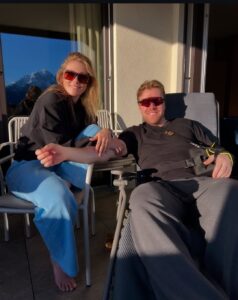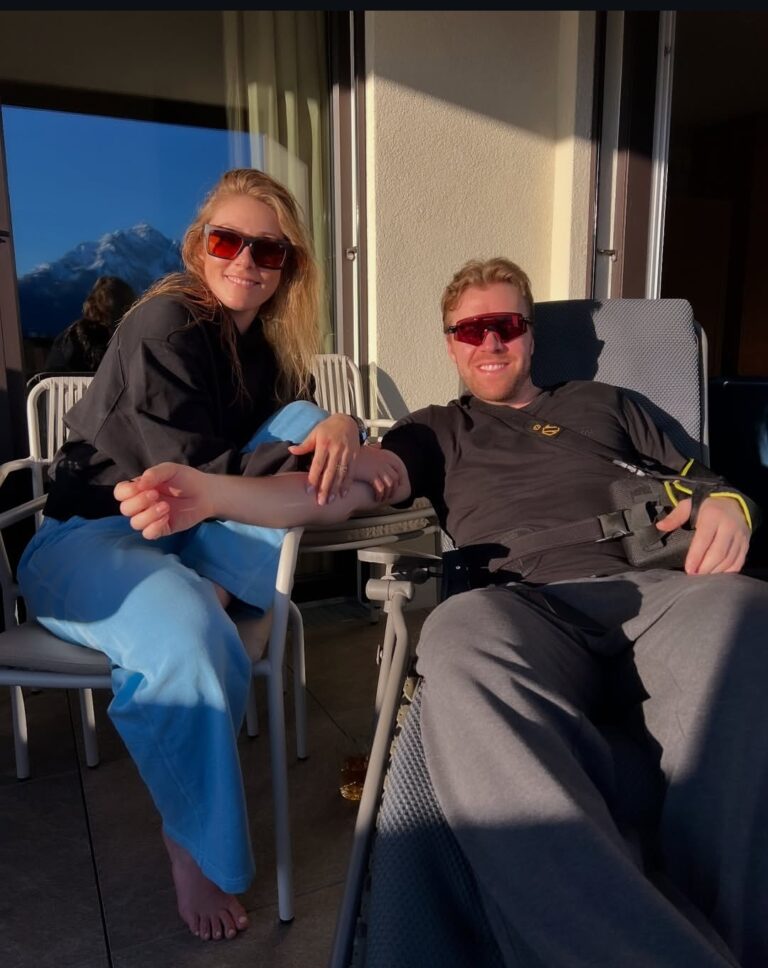In a raw and revealing conversation that peels back the layers of an elite athlete’s psyche, Norwegian alpine skier Aleksander Aamodt Kilde opened up about the invisible scars left by his devastating January 2024 crash—one that nearly cost him his life and continues to trigger nighttime panic attacks more than a year later. Sitting down with his fiancée, American skiing icon Mikaela Shiffrin, for the debut episode of her new podcast What’s the Point with Mikaela Shiffrin, Kilde described the uncontrollable fear of infection as far more terrifying than the high-speed wipeout itself, a confession that underscores the mental toll of physical trauma in high-stakes sports.
The 28-year-old Kilde, a two-time Olympic medalist and 2020 World Cup overall champion, was hurtling down the iconic Lauberhorn course in Wengen, Switzerland, at over 120 km/h when he lost control on the final turn, slamming into safety netting in a blur of snow and agony. The impact dislocated his right shoulder, tore two ligaments, severed tendons, and inflicted a deep laceration on his calf that required immediate nerve repair surgery in Bern. Airlifted from the scene, Kilde awoke to Shiffrin by his bedside, her presence a steady anchor amid the chaos. “This sport can be brutal, but I still love it,” he posted on X the next day, sharing a photo of the couple in the hospital with a bandaged-heart emoji—a poignant nod to both his resilience and their bond.
What followed was a grueling odyssey of recovery marked by setbacks that tested Kilde’s ironclad mental fortitude. Initial shoulder surgery in January repaired the rotator cuff and capsule, but excruciating post-operative pain—described by Kilde as “10/10, the worst I’ve ever felt”—triggered an anxiety attack exacerbated by pain medications. Weeks blurred into months of wheelchair-bound immobility, anatomy deep-dives, and incremental victories like sitting upright without fainting or showering for the first time in two weeks. Yet, hope dimmed in August 2024 when a lurking shoulder infection escalated into sepsis, a life-threatening blood poisoning that demanded emergency revision surgery in Austria. “I was close to getting blood poisoning,” Kilde later reflected in interviews, admitting he “just totally bunked” during the ordeal, his body and spirit pushed to the brink.
Now, with the 2025/26 World Cup season looming and eyes on a potential return at Beaver Creek in December, Kilde’s latest disclosures on Shiffrin’s podcast lay bare the lingering shadows. “The crash itself was fine—that’s part of the game,” he told Shiffrin, his voice steady but laced with vulnerability. “I’m sort of ready for it, or at least I thought I was. But the infection… that’s something so uncontrollable. It just came out of the blue. I felt like I did everything right.” He detailed how the fear persists: after ramping up training loads, normal rehab swelling sends him spiraling. “You get some fluid in there, which is very normal, but I always think about that fluid being an infection. So, that’s why I get those—call it a panic attack, which it is. Where I wake up alone and I’m like, ‘Oh sh*t, it is back?'” These episodes, he confessed, haunt him daily, more insidious than the physical grind.
Shiffrin, 30, the record-holding two-time Olympic champion and eight-time World Cup overall winner, has been Kilde’s unwavering “rock in the storm,” as she put it in earlier updates. Engaged since April 2024 after three years together, the couple’s shared experiences with injury—Shiffrin herself crashed in Cortina d’Ampezzo days after Kilde’s fall, sidelining her with a leg injury—have forged an unbreakable partnership. On her podcast Moving Right Along in early 2024, Shiffrin praised his unyielding positivity: “His last surgery was very successful… He’s taking everything step by step. I think we all know how motivated and strong he is, and his mentality is so positive and powerful.” She credited their inner circle for sustaining his optimism, adding that the sepsis scare brought “a sigh of relief” only after it was resolved, a rare bright spot in a “long time” of darkness. In a October 2024 X post, Shiffrin celebrated reuniting with him on World Mental Health Day, lauding his ability to “find reasons to smile” amid adversity.
Kilde’s candor arrives at a pivotal moment. Cleared for light snow sessions by mid-2025, he enrolled in an online course at the London School of Economics to stay engaged, admitting, “I’m more of a normal person than an athlete now.” Shiffrin has echoed concerns about long-term limitations, telling Swiss outlet blue Sport in late October that he “will remain restricted for the rest of his life,” a sobering reality for a skier whose career peaked with five podiums in the 2023/24 season before the crash derailed it. Yet, optimism flickers: Kilde eyes Milano Cortina 2026 as a redemption arc, provided he qualifies. “If I’m back in Beaver Creek, the Olympics can follow,” he said in a June Olympics.com interview.
The episode, released October 29, 2025, as both audio and YouTube video, has resonated deeply, amassing thousands of views and sparking conversations about mental health in endurance sports. Fans on X hailed Kilde’s bravery, with one writing, “From nets to nightmares—this is the real fight. Respect.” Another added, “Mikaela and Aleksander showing us vulnerability isn’t weakness; it’s the win.”
For Kilde and Shiffrin, whose lives intertwine on and off the slopes, this chapter is a testament to shared survival. As he told her on the podcast, “You were great” through it all—a simple phrase carrying the weight of gratitude, love, and the quiet determination to reclaim the mountains that both broke and bound them.
